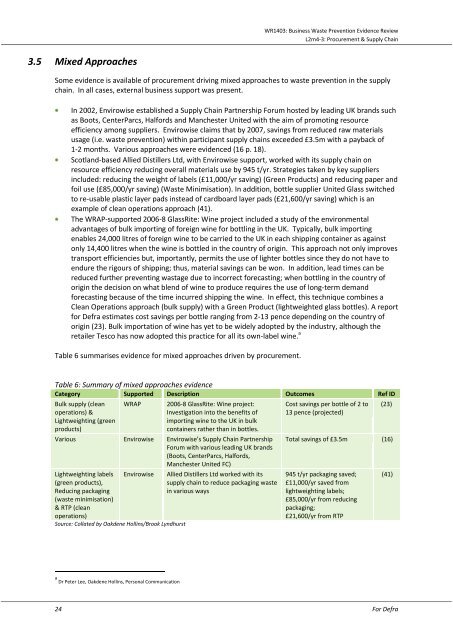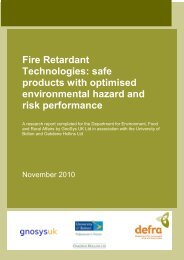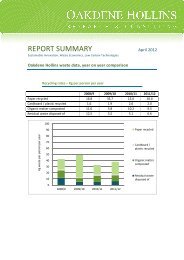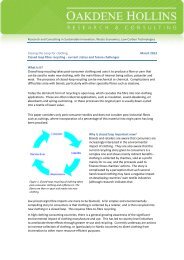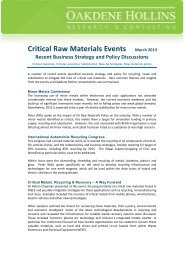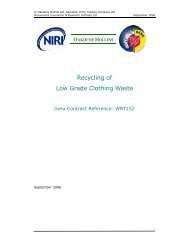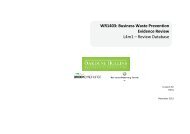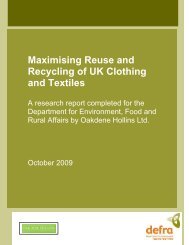Procurement and Supply Chain - Oakdene Hollins
Procurement and Supply Chain - Oakdene Hollins
Procurement and Supply Chain - Oakdene Hollins
Create successful ePaper yourself
Turn your PDF publications into a flip-book with our unique Google optimized e-Paper software.
WR1403: Business Waste Prevention Evidence Review<br />
L2m4-3: <strong>Procurement</strong> & <strong>Supply</strong> <strong>Chain</strong><br />
3.5 Mixed Approaches<br />
Some evidence is available of procurement driving mixed approaches to waste prevention in the supply<br />
chain. In all cases, external business support was present.<br />
In 2002, Envirowise established a <strong>Supply</strong> <strong>Chain</strong> Partnership Forum hosted by leading UK br<strong>and</strong>s such<br />
as Boots, CenterParcs, Halfords <strong>and</strong> Manchester United with the aim of promoting resource<br />
efficiency among suppliers. Envirowise claims that by 2007, savings from reduced raw materials<br />
usage (i.e. waste prevention) within participant supply chains exceeded £3.5m with a payback of<br />
1-2 months. Various approaches were evidenced (16 p. 18).<br />
Scotl<strong>and</strong>-based Allied Distillers Ltd, with Envirowise support, worked with its supply chain on<br />
resource efficiency reducing overall materials use by 945 t/yr. Strategies taken by key suppliers<br />
included: reducing the weight of labels (£11,000/yr saving) (Green Products) <strong>and</strong> reducing paper <strong>and</strong><br />
foil use (£85,000/yr saving) (Waste Minimisation). In addition, bottle supplier United Glass switched<br />
to re-usable plastic layer pads instead of cardboard layer pads (£21,600/yr saving) which is an<br />
example of clean operations approach (41).<br />
The WRAP-supported 2006-8 GlassRite: Wine project included a study of the environmental<br />
advantages of bulk importing of foreign wine for bottling in the UK. Typically, bulk importing<br />
enables 24,000 litres of foreign wine to be carried to the UK in each shipping container as against<br />
only 14,400 litres when the wine is bottled in the country of origin. This approach not only improves<br />
transport efficiencies but, importantly, permits the use of lighter bottles since they do not have to<br />
endure the rigours of shipping; thus, material savings can be won. In addition, lead times can be<br />
reduced further preventing wastage due to incorrect forecasting; when bottling in the country of<br />
origin the decision on what blend of wine to produce requires the use of long-term dem<strong>and</strong><br />
forecasting because of the time incurred shipping the wine. In effect, this technique combines a<br />
Clean Operations approach (bulk supply) with a Green Product (lightweighted glass bottles). A report<br />
for Defra estimates cost savings per bottle ranging from 2-13 pence depending on the country of<br />
origin (23). Bulk importation of wine has yet to be widely adopted by the industry, although the<br />
retailer Tesco has now adopted this practice for all its own-label wine. a<br />
Table 6 summarises evidence for mixed approaches driven by procurement.<br />
Table 6: Summary of mixed approaches evidence<br />
Category Supported Description Outcomes Ref ID<br />
Bulk supply (clean<br />
operations) &<br />
Lightweighting (green<br />
products)<br />
WRAP<br />
2006-8 GlassRite: Wine project:<br />
Investigation into the benefits of<br />
importing wine to the UK in bulk<br />
containers rather than in bottles.<br />
Various Envirowise Envirowise’s <strong>Supply</strong> <strong>Chain</strong> Partnership<br />
Forum with various leading UK br<strong>and</strong>s<br />
(Boots, CenterParcs, Halfords,<br />
Manchester United FC)<br />
Lightweighting labels<br />
(green products),<br />
Reducing packaging<br />
(waste minimisation)<br />
& RTP (clean<br />
operations)<br />
Envirowise<br />
Source: Collated by <strong>Oakdene</strong> <strong>Hollins</strong>/Brook Lyndhurst<br />
Allied Distillers Ltd worked with its<br />
supply chain to reduce packaging waste<br />
in various ways<br />
Cost savings per bottle of 2 to<br />
13 pence (projected)<br />
(23)<br />
Total savings of £3.5m (16)<br />
945 t/yr packaging saved;<br />
£11,000/yr saved from<br />
lightweighting labels;<br />
£85,000/yr from reducing<br />
packaging;<br />
£21,600/yr from RTP<br />
(41)<br />
a Dr Peter Lee, <strong>Oakdene</strong> <strong>Hollins</strong>, Personal Communication<br />
24 For Defra


